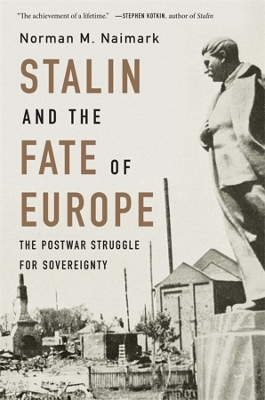
Stalin and the Fate of Europe
The Postwar Struggle for Sovereignty
Seiten
2023
Harvard University Press (Verlag)
978-0-674-29215-4 (ISBN)
Harvard University Press (Verlag)
978-0-674-29215-4 (ISBN)
It can seem as though the Cold War division of Europe was inevitable. But Stalin was more open to a settlement on the continent than is assumed. In this powerful reassessment of the postwar order, Norman Naimark returns to the four years after WWII to illuminate European leaders’ efforts to secure national sovereignty amid dominating powers.
A Financial Times Best Book of the Year
Winner of the Norris and Carol Hundley Award
Winner of the US–Russia Relations Book Prize
“The achievement of a lifetime.”
—Stephen Kotkin, author of Stalin
“Naimark has few peers as a scholar of Stalinism, the Soviet Union and 20th-century Europe, and his latest work Stalin and the Fate of Europe is one of his most original and interesting.”
—Financial Times
“A timely and instructive account not merely of our own history but also of our fractious, unsettling present.”
—Daniel Beer, The Guardian
“Adds an abundance of fresh knowledge to a time and place that we think we know, clarifying the contours of Soviet–American conflict by skillfully enriching the history of postwar Europe.”
—Timothy Snyder, author of Bloodlands
Was the division of Europe after World War II inevitable? In this powerful reassessment of the postwar order, Norman Naimark suggests that Stalin was far more open to a settlement than we have thought. Through revealing case studies from Poland and Yugoslavia to Finland and Albania, Naimark recasts the early Cold War by focusing on Europeans’ fight to determine their future.
With Western occupation forces in central Europe and Soviet forces controlling most of the continent’s eastern half, European leaders had to nimbly negotiate outside pressures. For some, this meant repelling Soviet dominance. For others, it meant enlisting the Americans to support their aims. Revealing an at times surprisingly flexible Stalin and showing European leaders deftly managing their nations’ interests, Stalin and the Fate of Europe uncovers the lost potential of an alternative trajectory before 1949, when the Cold War split became irreversible.
A Financial Times Best Book of the Year
Winner of the Norris and Carol Hundley Award
Winner of the US–Russia Relations Book Prize
“The achievement of a lifetime.”
—Stephen Kotkin, author of Stalin
“Naimark has few peers as a scholar of Stalinism, the Soviet Union and 20th-century Europe, and his latest work Stalin and the Fate of Europe is one of his most original and interesting.”
—Financial Times
“A timely and instructive account not merely of our own history but also of our fractious, unsettling present.”
—Daniel Beer, The Guardian
“Adds an abundance of fresh knowledge to a time and place that we think we know, clarifying the contours of Soviet–American conflict by skillfully enriching the history of postwar Europe.”
—Timothy Snyder, author of Bloodlands
Was the division of Europe after World War II inevitable? In this powerful reassessment of the postwar order, Norman Naimark suggests that Stalin was far more open to a settlement than we have thought. Through revealing case studies from Poland and Yugoslavia to Finland and Albania, Naimark recasts the early Cold War by focusing on Europeans’ fight to determine their future.
With Western occupation forces in central Europe and Soviet forces controlling most of the continent’s eastern half, European leaders had to nimbly negotiate outside pressures. For some, this meant repelling Soviet dominance. For others, it meant enlisting the Americans to support their aims. Revealing an at times surprisingly flexible Stalin and showing European leaders deftly managing their nations’ interests, Stalin and the Fate of Europe uncovers the lost potential of an alternative trajectory before 1949, when the Cold War split became irreversible.
Norman M. Naimark is the critically acclaimed author of Fires of Hatred: Ethnic Cleansing in Twentieth-Century Europe, The Russians in Germany, and Stalin’s Genocides. He is Robert and Florence McDonnell Professor of East European Studies at Stanford University and a Senior Fellow (by courtesy) of the Hoover Institution and the Freeman-Spogli Institute. He received the Richard W. Lyman Award and Dean’s Teaching Award from Stanford University.
| Erscheinungsdatum | 10.01.2023 |
|---|---|
| Zusatzinfo | 8 Maps |
| Verlagsort | Cambridge, Mass |
| Sprache | englisch |
| Maße | 156 x 235 mm |
| Gewicht | 544 g |
| Themenwelt | Geschichte ► Allgemeine Geschichte ► 1918 bis 1945 |
| Geschichte ► Allgemeine Geschichte ► Zeitgeschichte | |
| Geisteswissenschaften ► Geschichte ► Regional- / Ländergeschichte | |
| Geschichte ► Teilgebiete der Geschichte ► Militärgeschichte | |
| Sozialwissenschaften ► Politik / Verwaltung ► Politische Systeme | |
| Sozialwissenschaften ► Politik / Verwaltung ► Politische Theorie | |
| ISBN-10 | 0-674-29215-4 / 0674292154 |
| ISBN-13 | 978-0-674-29215-4 / 9780674292154 |
| Zustand | Neuware |
| Informationen gemäß Produktsicherheitsverordnung (GPSR) | |
| Haben Sie eine Frage zum Produkt? |
Mehr entdecken
aus dem Bereich
aus dem Bereich
ein Psychologe erlebt das Konzentrationslager
Buch | Hardcover (2024)
Kösel (Verlag)
CHF 30,80
Mythos „Stauffenberg-Attentat“ – wie der 20. Juli 1944 verklärt und …
Buch | Hardcover (2024)
Goldmann (Verlag)
CHF 33,55


